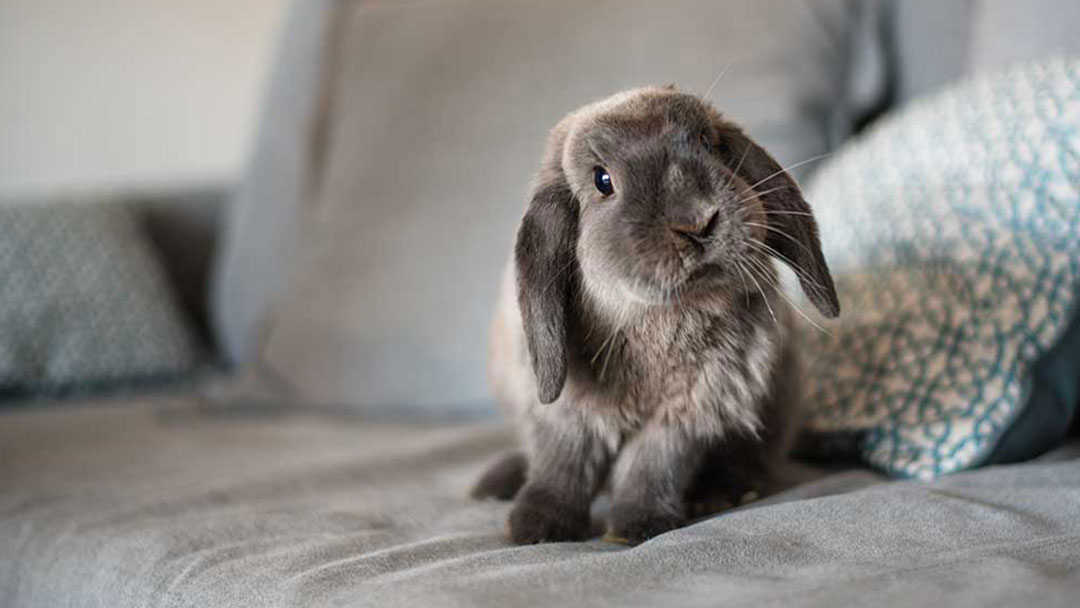
Rabbit Health
There are numerous rabbit breeds such as the New Zealand White, the Angora, the Lop, and various Dwarf breeds. Despite your rabbit’s breed, to ensure the health of your pet it is important to get the basics right.
- Housing
Rabbits are naturally preyed upon by carnivores. Their instinct when scared is to find a place to hide. Whether your rabbit is indoors or outdoors they need the protection of a nesting box to take refuge in when scared. Outdoor rabbits can have the run of the garden or but we advise to have your rabbits protected in a hutch covered with mosquito netting especially dawn and dusk (peak mosquito periods). The hutch should be warm and well ventilated and provide protection from extremes of temperature and drafts. - Diet
Diet is vitally important with rabbits. Rabbits are hind gut fermenters. This enables them to digest the tough, fibrous, dry grasses. The wrong food can upset the gut balance with disastrous results. For the best diet try to mimic a natural, wild diet. Rabbits diet should contain:- Good quality hay (high in fibre and protein) such as Lucerne.
- Balanced commercial rabbit food: pellets are best as it prevents selective eating. Very god but watch obesity.
- Grass (not lawn mower clipping).
- Access to water. (drink about 10% BW per day)
Limit access to vegetable scraps as these often can cause diarrhoea. Treats such as refined bread biscuits etc can cause more harm than good.
- Teeth
Rabbits are built to chew. But just watch what they chew. Indoor rabbits especially have a penchant for electrical cables that can have fatal consequences. Unlike cats and dogs rabbits teeth continually grow. An incorrect diet does not wear the teeth enough and can cause teeth to overgrow. The front teeth are obvious when overgrown but the back teeth can develop nasty spikes that lacerate the tongue and cheeks.If your rabbit has gone off its feed then it is important to get it’s teeth checked. Make an appointment at FVH today to check your rabbit’s teeth. - Flea Control
Rabbits get fleas. Controlling fleas is an important factor in reducing exposure to myxomatosis. Advantage Flea control is recommended. Our staff can assist you with your decision. - Viral Diseases
- Myxomatosis
Originally introduced as a biological control of rabbits it is spread through mosquito and flea bites. This disease is more prevalent in warmer months. It is highly morbid causing swelling of eyes, face, genitals and skin. Often the animal is blinded by the swelling. Unfortunately there is no vaccination against the disease in Australia and recovery unlikely even with supportive veterinary treatment. To avoid contact with myxomatosis we advise flea control and providing mosquito proof netting over the hutch. Limit the outdoors access at dawn and dusk (peak mosquito periods) and clean any stagnant water from the area. - Calicivirus (HVD, RCD, VHD)
Released as a biological control at towards the end of last century this virus is responsible for sudden death in rabbits. The disease only affects the European rabbit which is the base for our domestic pets. The disease is spread through direct contact with wild rabbits but, can spread indirectly on clothing, feed, other animals and possibility of insect transmissions. Annual vaccination can effectively prevent this lethal disease. - Myiasis (Fly strike)
During the warmer months flies will be attracted to urine and faecal soiled breaches. The maggots hatch to then eat away the layers of the skin and bury into the body. This problem can arise quickly. Myiasis can result in death or euthanasia of your rabbit!
Precautions:
Hygiene: keep your rabbit clean! If your rabbit is dirty, wash and dry the area thoroughly
Vigilance: check your rabbit twice daily for any soiled areas
- Myxomatosis
- Desexing
Desexing rabbits not only reduces unwanted kittens (baby rabbits) but, has many health benefits. Desexed rabbits tend to be quieter and less likely to fight. Although bunnies have a reputation for being cute n’ cuddly, their fights can lead to serious injuries. Female rabbits have a high incidence of uterine cancer. Desexing early can stop this. Most importantly rabbits are great actors. If you notice and illness act quickly. It is bound to be more serious than your pet rabbit is indicating.